Qualified Teams for the 2020 SPL Team Competition in Bordeaux:
Bembelbots (Germany), Berlin United (Germany), B-Human (Germany), Dutch Nao Team (The Netherlands), HULKs (Germany), JAGUAR (Brazil), MiPal (Australia / Spain), Nao Devils (Germany), Nao-Team HTWK (Germany), Naova (Canada), NomadZ (Switzerland), Rinobot Team (Brazil), RoboEireann (Ireland), rUNSWift (Australia), SABANA Herons (Colombia), SPQR (Italy), UPennalizers (USA), UT Austin Villa (USA), RedBackBots (Australia), Starkit (Russia), TJArk (China), UnBeatables Team (Brazil), XBMUAttila (China), XMURover (China)
Waitlisted Teams for the 2020 SPL Team Competition in Bordeaux:
1st alternate: Schulich DinoBytes (Canada)
Regional Open Qualified Teams for 2020:
RoboDucks (Austria)
International SPL 2020 Competitors:
Note: The following listing is a work in progress, and should not be considered to be an extensive list of all qualified 2020 SPL teams. Team information is being posted as it is received from teams.
|
|
|
 Bembelbots |
Team Contact: Institutes: |
| Team Profile: | The RoboCup team Bembelbots was founded in 2009 at the Goethe University Frankfurt (Main), Germany, as a group fully organized by students. As there is no robotics group at the university, the team shall help students to increase their experience in robotics, as well as programming skills in addition to the theoretical orientation of the computer science degree program of the university. For that reason, we started developing our own framework from scratch. Team Bembelbots has regularly competed in the RoboCup German Open since 2010 as well as the RoboCup Worldcups in 2012, 2013 & 2016-2019. |
| Research Topics: | Machine Learning, Localization, Behavior Modeling, Software architecture |
| Team Report: | Team Research Report 2019 |
|
|
|
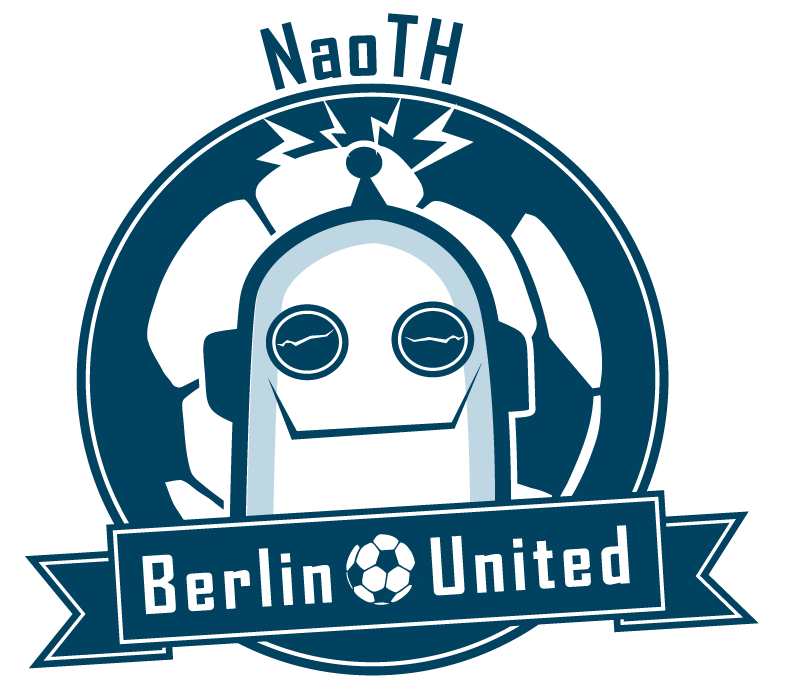 Berlin United – Nao Team Humboldt (BU-NaoTH) |
Team Contact: Institutes: |
| Team Profile: | “Berlin United” (former Nao Team Humboldt (NaoTH)) is part of the Adaptive Systems group at the Humboldt-Universität zu Berlin.
Our group has been involved in RoboCup since 1998 with various teams in different leagues. The team Berlin United has been established in 2007. Besides the direct participation at the RoboCup competitions Berlin United is actively involved in teaching at the university, public engagement and fostering of the RoboCup community. Our research interests span a wide spectrum including software architecture and tools, basic motion control, visual spatial perception, proprioception, state estimation and modeling, high level planning and team coordination. Two of our most recent projects focused on simulation based decision making, and an infrastructure for gathering and evaluation of the data from the RoboCup games on a large scale: http://robocup.tools. The latter project aims to foster data driven research within RoboCup and was supported by a RCF League Development grant in 2017 and 2018. |
| Research Topics: | Simulation Based Decision Making, Spatial Perception and State Estimation, Attention Control, Dynamic Motion Control, Team Coordination, Machine Learning and Data Driven Development |
| Team Report: | Team Report 2018 |
|
|
|
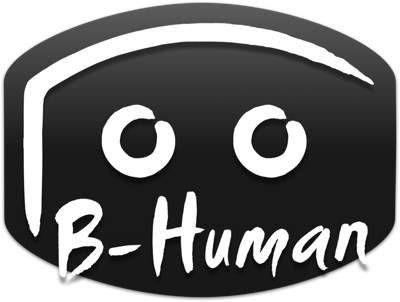 B-Human |
Team Contact: Institutes: |
| Team Profile: | B-Human consists of students from the University of Bremen in their advanced study period and researchers from both the University Bremen and the DFKI Bremen. In the past, members of the B-Human team participated in different RoboCup leagues. B-Human won the RoboCup World Championships 2009, 2010, 2011, 2013, 2016, 2017, and 2019. We also won the RoboCup German Open 2009-2017 and 2019, the European Open in 2016, the RoboCup Technical Challenges in 2009, 2013, 2014, 2015, 2017, and 2018, the Drop-in Player competitions at the RoboCup German Open 2014 and 2015 and at the RoboCup 2014 and 2016, and all Mixed Team Competitions of the league. In addition, B-Human team members earned the Best Paper Award at the RoboCup Symposiums 2010 and 2013. In 2020, we intend to participate again in the RoboCup German Open and in the RoboCup World Championship. |
| Research Topics: | Probabilistic state estimation, real-time computer vision, machine learning, robot simulation, motion control |
| Team Report: | 2019 Team Report and Code Release |
|
|
|
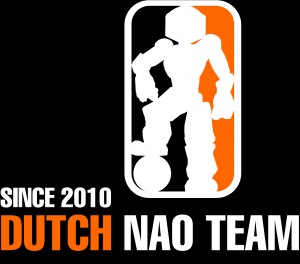 Dutch Nao Team |
Team Contact: Institutes: |
| Team Profile: | The Dutch Nao Team consists of bachelor students, master students and alumni, supported by a senior staff-member. The team debuted at the German Open 2010 and made its breakthrough by qualifying for RoboCup Istanbul in 2011. In 2017, the team started its own new framework where each module represents one algorithm handling a task in the football playing robot. |
| Research Topics: | Computer vision, behaviour control, probabilistic robotics, machine learning |
| Team Report: | 2019 Technical Report |
|
|
|
 HULKs |
Team Contact: Institutes: |
| Team Profile: | HULKs is student association of graduate and undergraduate students established in 2013 working in their leisure time or in thesis works on RoboCup SPL topics. We developed an own NAO framework. Team members participated at RoboCup from 2014 to 2019, IranOpen 2017, 2018, GermanOpens in 2014, 2015 and 2017 – 2019 and EuropeanOpen in 2016. For 2015, 2017 – 2020 we were prequalifed for the RoboCup. Our best result in RoboCup is the fourth place in 2018. We organize the RoHOW for the last six years. |
| Research Topics: | Fast and reliable software frameworks, biped walking, machine learning, computer vision, path planning |
| Team Report: | 2019 Team Research Report |
|
|
|
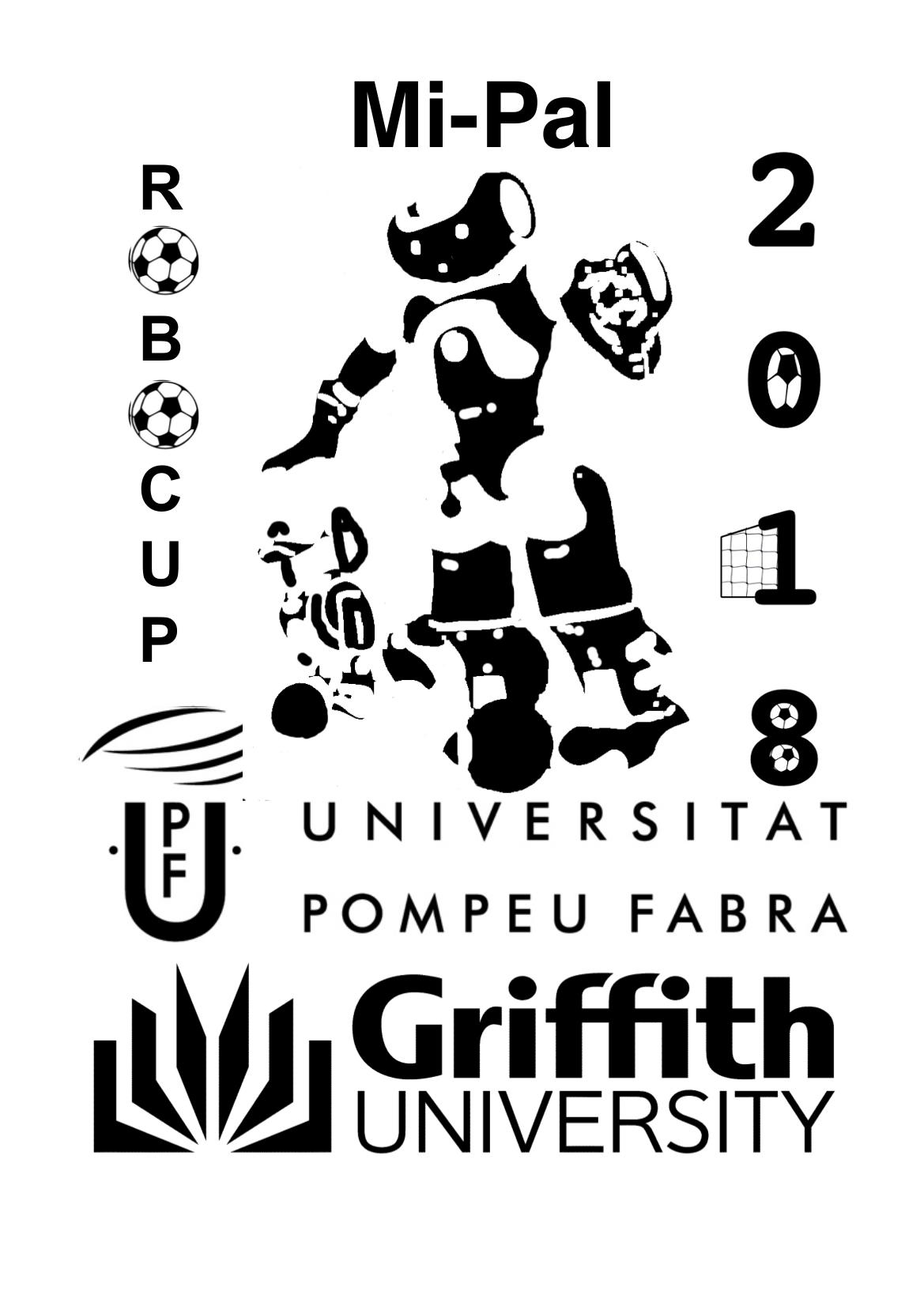 MiPal |
Team Contact: Institutes: |
| Team Profile: | We build behaviours using a Behaviour Based-Control (NNC) architecture. Our behaviours are encoded as logic-labelled finite state machines (LLFSMs). The Llfsm can be considered as Augmented Timed Finite-State Machines similar to the original LISP-based behaviours of the subsumption architecture and the Toto robot. Our advances are that LLFSMs are sequentially executed by a pre-defined schedule avoiding issues of timing and controlled concurrency (as opposed to the event-driven nature of executable UML state-charts). We can compile them for simple-C, C++ and swift (and interpret them for LISP and Haskell). We also produce Kripke models for their formal verification with NuSMV. We demonstrate practical quality of BBCcontinuous integration of behaviours by using a headless simulator. We also work on algorithms for computer vision, adapting deep-learning methods to the scene recognition of all the relevant objects in a soccer match and also enabling their fast execution in the reduced CPU power on boards of roots to achieve high frame-rates. Lately, we have mixed the emerging technologies of virtual reality (and headset devices and controllers) to explore tele-existence. In particular, we have investigated the reactions of adults and children to being immersed in the body of a Nao and engage on a soccer competition with autonomous Naos under conditions similar to the RoboCup Standard Platform League. |
| Research Topics: | Software Engineering For Robotics / Computer Vision / Merging Task Planning and Motion Planning / Agents and Reasoning |
| Team Report: | Team Description Paper |
|
|
|
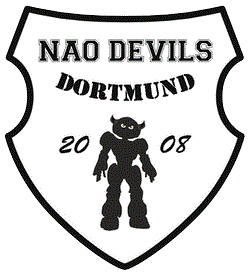 Nao Devils |
Team Contact: Institutes: |
| Team Profile: | The team consists of researchers and students of TU Dortmund University. We participate in RoboCup competitions since 2002 with several different teams: Microsoft Hellhounds and as part of the German Team (4-Legged-League), DoHBots (Humanoid League), and BreDoBrothers (together with University Bremen) and now as Nao Devils in the Standard Platform League. |
| Research Topics: | biped walking, computer vision, stochastic filtering, artificial intelligence, deep learning, beam forming |
| Team Report: | 2019 Team Report |
|
|
|
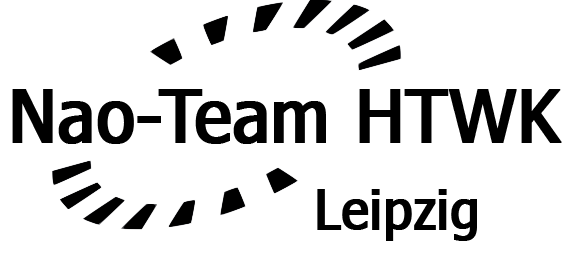 Nao-Team HTWK |
Team Contact: Institutes: |
| Team Profile: | Nao-Team HTWK is a RoboCup team that consists of graduate and undergraduate students of Leipzig University of Applied Sciences and was founded in 2009. The team participated in RoboCup 2009-2018 as well as the RoboCup German Open 2009-2018. |
| Research Topics: | Evolutionary Algorithms, Biped Walking, Artificial Intelligence, Multi-Robot Coordination, Computer Vision, Localization |
| Team Report: | 2018 Team Report |
|
|
|
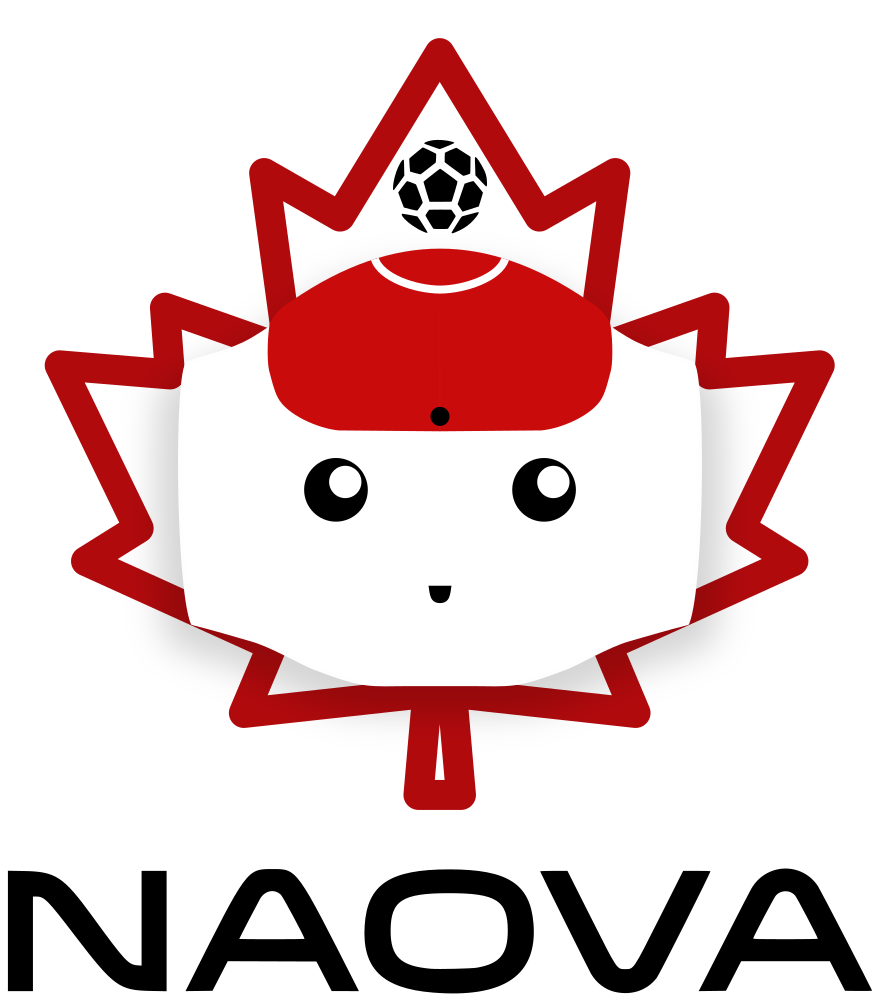 Naova ETS |
Team Contact: Institutes: |
| Team Profile: | Naova is a relatively young team, with one year experience in the standard platform league (SPL) division and in various other divisions in robotics, and we strive to develop our skills in the SPL division. Composed of 10 engineering students from École de Technologie Supérieure (ÉTS) – Montréal, Québec, Canada. The team consists of a pool of a diversified and talented group of engineering students with various background expertise whom all share the same passion for robotics and its applications. The scientific university club Naova pushes for its members to surpass themselves. By their active involvement in the clubs day-to-day activities , the members get a chance to prove themself which is an opportunity to show their engagement and expertise in a competitive environment. The international competition is a good opportunity for education, advancement and innovation of the members of the club. |
| Research Topics: | deep learning; reinforcement learning; nonlinear control; vision; Backstepping; Sliding mode; Time delay estimation |
| Team Report: | N/A |
|
|
|
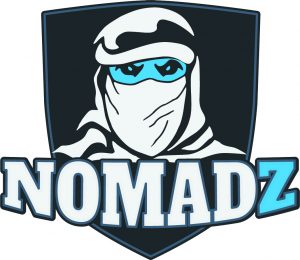 NomadZ |
Team Contact: Institutes: |
| Team Profile: | The NomadZ from ETH Zurich, Switzerland, participated for the first time in the RoboCup 2016 Team Competition. The team consists of five to ten graduate students from the Department of Information Technology and Electrical Engineering and the Department of Mechanical and Process Engineering and are supervised by four Ph.D. students. Our work is based on the B-Human code release 2013 and we have implemented modifications and additions in the area of perception, behavior and to a limited extent in motor control. |
| Research Topics: | Automatic calibration, Deep Learning, Kicking, Optimal Game Strategy, Sensor Fusion |
| Team Report: | N/A |
|
|
|
 RoboEireann |
Team Contact: Institutes: |
| Team Profile: | RoboEireann is Ireland’s only SPL team and comprises students and staff from the Maynooth University Electronic Engineering and Computer Science departments. In previous competitions we have attained 1st place in RoboCup 2008 as part of NUManoids (a joint effort with Newcastle University, Australia), 1st place in RoboCup 2011 Technical Challenge, 2nd place in the 2012 German Open, and the quarter-finals of RoboCup 2013. |
| Research Topics: | Computer vision, robust localization, individual and multi-agent behaviour, closed-loop kinematics, software for autonomous systems. |
| Team Report: | N/A |
|
|
|
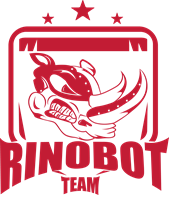 Rinobot Team |
Team Contact: Institutes: |
| Team Profile: | Rinobot Team is a robotics competition team from Federal University of Juiz de Fora. Our team is consisted of 76 members from 12 different undergraduate courses, among them Electrical Engineering, Mechanical Engineering, Computer Science and Mathematics. The team has 5 different categories, including SPL. The latter is consisted of 18 members, 16 of are from undergraduate courses and 2 from graduate courses. The General Team Leader is Gabriel Damasceno, whereas the SPL Team leader is Olange Guerson Gonçalves Coutinho. |
| Research Topics: | Based on feedback obtained from other teams during the Robocup 2018, we developed a whole new code structure that allows for more to be done in less time, keeping the code quality and adding features to the system gradually. The most recent research topics are:
|
| Team Report: | N/A |
|
|
|
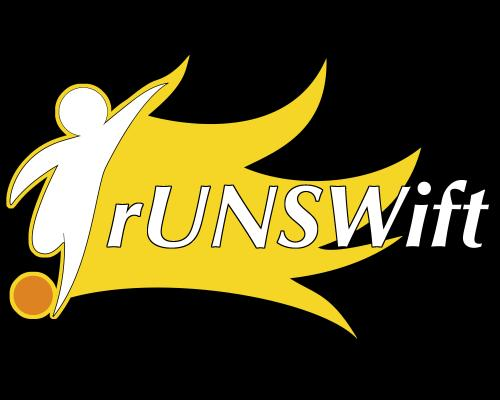 rUNSWift |
Team Contact: Institutes: |
| Team Profile: | rUNSWift is the University of New South Wales’ RoboCup SPL team. The team is mostly made up of undergraduate students from Computer Science and Mechatronic Engineering, with some postgraduate and alumni members. Undergraduate students are often enrolled in an Honours thesis or Special Project course as part of their studies. The team has competed in SPL since 1999 and won the championship in 2014 and 2015. |
| Research Topics: | Autonomous Systems is a priority research topic in robotics at CSE, UNSW. Our general research focus, of which the RoboCup SPL is a part, is to:
|
| Team Report: | 2019 Release |
|
|
|
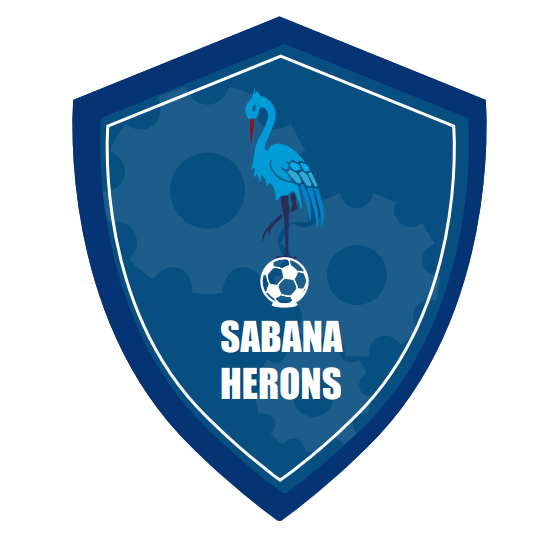 SABANA Herons |
Team Contact: Institutes: |
| Team Profile: | The SABANA Herons team is the result of the collaboration between the mechanical engineering and informatics engineering departments of the Universidad de La Sabana. The team was born out of the students’ desire to carry out projects that bring together different fields of engineering in order to solve complex problems that can be compared with real-world systems, as well as their desire to form multidisciplinary groups that require teamwork. Our team was founded in 2017 and has been gaining experience in different robotics competitions, some in the national context and others internationally. In recent years, the university has been able to participate in various global competition events, such as Shell Eco-Marathon Americas (Detroit 2017, Sonoma 2018 and Sonoma 2019) and RoboCup SPL 2019 in Sydney, Australia, where we got to the finals of the challenge shield. |
| Research Topics: | Distributed Optimization, Evolutionary Algorithms, Distributed Predictive Control, Game Theory. |
| Team Report: | N/A |
|
|
|
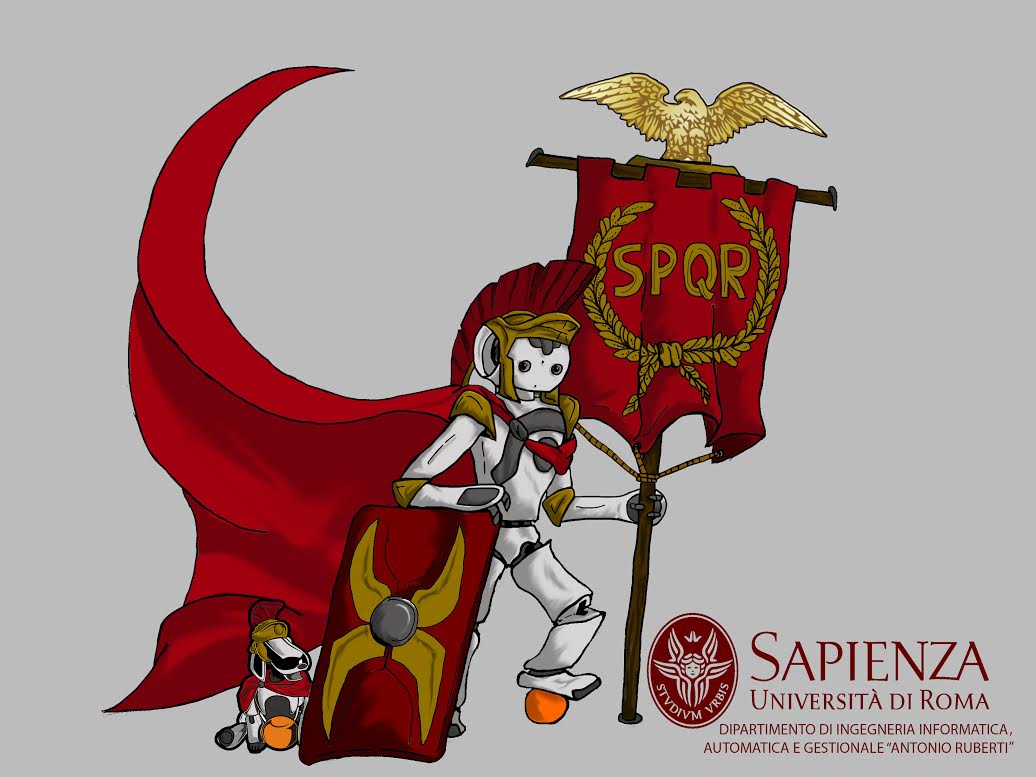 SPQR Team |
Team Contact: Institutes: |
| Team Profile: | SPQR is the group of the Department of Computer, Control, and Management Engineering “Antonio Ruberti” at Sapienza University of Rome (Italy). SPQR Team has been involved in RoboCup competitions since 1998 in different leagues: Middle-size 1998-2002, Four-legged 2000-2007, Real rescue robots 2003-2006, @Home in 2006, Virtual-rescue since 2006 and Standard Platform League (SPL) since 2008. SPQR team members published a total of 18 papers in RoboCup Symposia (including best paper awards in 2006 and 2015), in addition to many other publications about RoboCup-related activities on International Journals and Conferences in Artificial Intelligence and Robotics (including IROS RoboCup Best Paper Award in 2016). |
| Research Topics: | Multi-robot coordination, Multi-object tracking, Robot learning, Perception, Localization. |
| Team Report: | 2018 Team Description Paper |
|
|
|
 Starkit |
Team Contact: Institutes: |
| Team Profile: | Team Starkit was organized in Moscow institute of physics and technology (MIPT) in October 2018 by the financial support of the founder Azer Babaev on the base of the Laboratory of wave processes and control systems of MIPT. The team consists mainly of students from different departments. |
| Research Topics: | mechatronic, robot design, programming |
| Team Report: | Team Research Report |
|
|
|
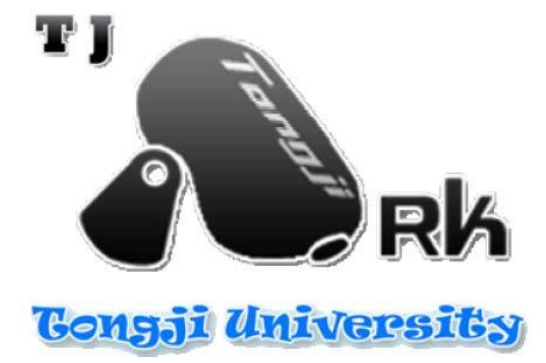 TJArk |
Team Contact: Institutes: |
| Team Profile: | TJArk was established in 2004 as a part of the Robots and Intelligent Systems Lab of Tongji University in China. The team consists of graduate and undergraduate students. All the members are from School of electronic and information engineering. The TJArk participated in the RoboCup SPL competition from 2006 through 2018. We entered the quarter finals in 2007, 2008, 2016 and the Champions Cup quarter finals in 2017. We finished in the third place in 2018. We are the SPL Champion in RoboCup China Open in latest six years. |
| Research Topics: | Pattern Recognition, Machine Learning, Computer Vision, Motion Control of Biped Robot, Multi-agent Systems, Path Planning |
| Team Report: | 2018 Team Report |
|
|
|
 UPennalizers |
Team Contact: Institutes: |
| Team Profile: | The University of Pennsylvania RoboCup team was one of the first participants in the original Sony Aibo league (renamed the Standard Platform 4-legged league in 2004), and participated in all the international competitions between 1999-2006. The team finished among at least the quarterfinalists in every one of those eight years. After a short hiatus in 2007-2008, we have reformulating the team with a new group of undergraduates and graduate students from various departments at the Engineering School at the University of Pennsylvania. |
| Research Topics: | Real time lighting invariant perception, robust and natural locomotion, dynamic coordination in multi-agent robotics soccer team |
| Team Report: | 2018 Team Report, 2016 Code Release |
|
|
|
 UT Austin Villa |
Team Contact: Institutes: |
| Team Profile: | Our team is from the University of Texas at Austin. We participated in the Aibo league starting in 2003 and started with the Naos in 2007. We also field a team in the RoboCup 3D simulation league. We won the 2009, 2010, 2012, 2016 and 2018 SPL US Opens. At the international RoboCup SPL competitions, we made the quarterfinals in 2009, 2015 and 2018, finished in 4th place in 2017, finished in 3rd place in 2010 and 2013, finished in 2nd place in 2016, and won the championship in 2012. |
| Research Topics: | Self localization, vision algorithms, multi-agent task allocation, obstacle avoidance, reinforcement learning, ad hoc teamwork |
| Team Report: | 2018 Code Release |
|
|
|
